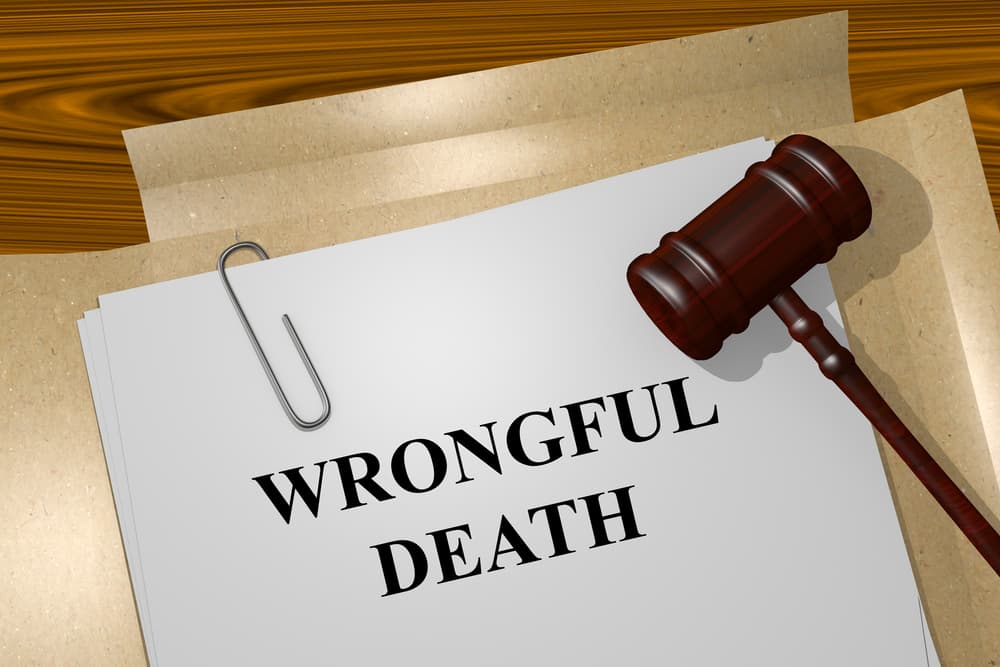In Texas, the right to file a wrongful death suit is reserved for the deceased person's surviving spouse, children, and parents. While this seems straightforward, the legal process involves specific rules and timelines that can be difficult to navigate, especially while grieving the loss of a loved one. Understanding who is eligible to take legal action can help you seek accountability and justice for your family.
Losing someone you love is an unimaginable tragedy, and the pain is only deepened when their death was caused by someone else’s careless or wrongful actions. While no amount of money can replace your family member, a wrongful death lawyer can help you file a claim to provide a sense of justice and the financial stability needed to move forward.
Key Takeaways for Who Can File a Wrongful Death Lawsuit
- A wrongful death lawsuit is a civil action brought against a party whose negligent or wrongful act caused someone's death.
- The Texas Wrongful Death Act specifically names the surviving spouse, children, and parents as the parties eligible to file a claim.
- If these immediate family members do not file a suit within three months of the death, the personal representative of the deceased's estate may be able to file on their behalf.
- The statute of limitations, or legal deadline, for filing a wrongful death claim in Texas is generally two years from the date of the person's death.
- Compensation recovered in a wrongful death suit can address both economic losses, like lost income, and non-economic damages, such as emotional anguish and loss of companionship.
Understanding What a Wrongful Death Claim Is in Texas
Before diving into who can file, it’s helpful to understand what a wrongful death claim actually is. When a person dies because of the negligence, carelessness, or wrongful act of another individual or company, the law allows certain family members to seek justice through a civil lawsuit. This is known as a wrongful death claim.
It’s important to distinguish this from a criminal case. A criminal case, like one for vehicular manslaughter, is brought by the state to punish the wrongdoer with penalties like jail time or fines. A wrongful death claim, on the other hand, is a civil action filed by the family to hold the at-fault party financially accountable for the harm they caused. The two cases can happen at the same time and are completely separate from one another.
The foundation of most wrongful death claims is negligence. In simple terms, negligence means that:
- Someone had a responsibility to act with reasonable care (a "duty of care").
- They failed to uphold that responsibility (they "breached" their duty).
- Their failure directly caused the death of your loved one.
This could apply to a driver who was texting and caused a fatal crash on US-69 near Tyler, a trucking company that failed to maintain its 18-wheeler, leading to a tragic accident on I-20, or a property owner who didn't fix a dangerous condition that led to a fatal fall.
The Specific People Who Can File a Wrongful Death Suit in Texas

The Texas legislature has created a specific law, the Texas Wrongful Death Act, that clearly outlines who is permitted to bring this type of lawsuit. According to the Texas Civil Practice and Remedies Code § 71.004, the right to file belongs exclusively to a small group of immediate family members.
These eligible parties are:
- The Surviving Spouse: The legal husband or wife of the person who passed away has the primary right to file a claim.
- The Surviving Children: This includes biological children and legally adopted children, regardless of their age. An adult child has the same right to file as a minor child.
- The Surviving Parents: The biological or adoptive parents of the deceased can also file a wrongful death suit. This is true even if their child was an adult with a family of their own.
These individuals can decide to file the lawsuit together as a group, or any one of them can file it on behalf of everyone. For instance, a surviving spouse could file a claim that also seeks damages for the couple’s children.
This strict list, defined by Texas law, means that the emotional closeness of a relationship does not automatically grant the right to file a lawsuit.
What About Other Family Members?
This is a question that understandably causes confusion and heartache for many families. You may have had a deeply meaningful relationship with the person who passed away, but the law is very precise.
In Texas, the following individuals generally cannot file a wrongful death claim:
- Siblings: Brothers and sisters are not listed in the statute as eligible parties.
- Grandparents: Unless a grandparent has legally adopted their grandchild, they do not have the standing to file.
- Unmarried Partners: A long-term partner or fiancé is not considered a "surviving spouse" under the law.
- Stepparents or Stepchildren: These relationships are also not included unless a legal adoption has occurred.
While this can be difficult to accept, the law aims to provide a clear path for the closest surviving relatives to seek justice without creating conflicting claims from a wider circle of family and friends.
The Role of the Personal Representative or Executor
What happens if the spouse, children, or parents do not file a claim? The law provides a secondary option. If none of the eligible family members file a wrongful death lawsuit within three calendar months of the person’s death, the personal representative of the deceased's estate can then file the claim.
A personal representative (also called an executor or administrator) is the person legally appointed to manage the deceased’s estate—their property, finances, and debts. This person is either named in the deceased’s will or appointed by a court.
There is one important exception: the personal representative cannot file the suit if all the eligible family members (the spouse, children, and parents) come together and specifically request that a lawsuit not be filed. This provision ensures that the family's wishes remain the top priority.
The Critical Deadline: The Statute of Limitations for Wrongful Death Claims
In any legal matter, timing is critical. Texas law sets a strict deadline for filing a wrongful death lawsuit, known as the statute of limitations. If you miss this deadline, you will almost certainly lose your right to ever seek compensation from the at-fault party.
Under the Texas Civil Practice and Remedies Code § 16.003, a wrongful death lawsuit must be filed within two years of the date of the person's death.
This two-year window might seem like a long time, but it can pass incredibly quickly when a family is grieving and trying to put their lives back together. It is also crucial to begin investigating the circumstances of the death as soon as possible. Key evidence, like vehicle data recorders in a truck accident or security footage from a business, can be lost or destroyed over time. Witnesses’ memories can fade.
While there are some very rare exceptions that can extend this deadline, such as for minor children, it is always best to assume the two-year clock is ticking. Hiring a personal injury lawyer and taking prompt action is the best way to protect your family’s legal rights.
What Kind of Compensation Can Be Recovered in a Wrongful Death Lawsuit?

The purpose of a wrongful death claim is to recover compensation, often referred to as "damages," for the profound losses the surviving family members have endured. These damages are intended to provide financial support and acknowledge the immense emotional and personal impact of the death.
Damages in a wrongful death case are typically divided into two categories:
- Economic Damages: These are the tangible, calculable financial losses your family has suffered. This can include compensation for the loss of the deceased’s earning capacity, the value of lost inheritance, medical bills incurred before death, funeral and burial expenses, and the loss of services the person provided, such as childcare, home maintenance, or financial management.
- Non-Economic Damages: These damages compensate for the intangible, personal losses that have no simple price tag. This includes the surviving family members’ mental and emotional anguish, loss of companionship and society (for a spouse), and the loss of love, comfort, guidance, and support.
In addition to these, a separate but related claim called a "survival action" can be brought by the estate. This claim seeks damages that the deceased person could have recovered if they had survived, such as for their own physical pain and suffering experienced before they passed away.
Seeking compensation is not about putting a price on a life. It is about holding the responsible party accountable and securing the resources your family needs to face a future that has been permanently altered.
How Do You Prove a Wrongful Death Claim?
Successfully pursuing a wrongful death claim requires building a strong case supported by clear evidence. To hold the at-fault party accountable, your legal team must prove several key elements.
The necessary steps to build a case often include:
- Establishing a Duty of Care: First, you must show that the person or company you are suing (the defendant) had a legal responsibility to act with a certain level of care. For example, all drivers on East Texas roads have a duty to operate their vehicles safely and obey traffic laws.
- Proving a Breach of Duty: Next, you must prove that the defendant failed to meet that responsibility. A driver who was speeding, a doctor who failed to diagnose a treatable illness, or a company that sold a defective product all could have breached their duty of care.
- Linking the Breach to the Death (Causation): It’s not enough to show that the defendant was careless. You must directly link their negligent action (or inaction) to the death of your loved one. This often requires thorough accident reconstruction, expert testimony, and careful review of medical records.
- Demonstrating Damages: Finally, you must show that the surviving family members have suffered actual harm—both financial and emotional—as a result of the death.
This process involves gathering police reports, interviewing witnesses, preserving physical evidence, and working with experts who can provide testimony on everything from medical standards of care to a family's economic losses.
Wrongful Death Lawsuits FAQs
Here are answers to some common questions that arise when families are considering a wrongful death claim.
What if the deceased was partially at fault for the accident?
Texas follows a "proportionate responsibility" rule, also known as modified comparative fault. This means that if your loved one was found to be partially at fault, your family can still recover damages, as long as their share of the blame is 50% or less. The compensation award would be reduced by their percentage of fault. If they are found to be 51% or more at fault, the family cannot recover any damages.
Can I file a wrongful death claim if the person at fault is also facing criminal charges?
Yes, you can. The criminal case and the civil wrongful death claim are two separate legal proceedings with different goals. The outcome of the criminal case does not necessarily determine the outcome of your civil claim, although a conviction can sometimes be used as evidence of fault.
Do I have to pay legal fees upfront to file a wrongful death lawsuit?
Most personal injury law firms that handle these cases work on a contingency fee basis. This means you do not pay any attorney's fees unless and until they win your case and recover compensation for you. The fee is typically a percentage of the final settlement or verdict.
Richards Penn Bonner, LLP: We Are Here for You

Losing a family member is a devastating experience. You do not have to face this journey alone. The compassionate and determined team at Richards Penn Bonner, LLP, is here to listen to your story and help you understand your legal options. With deep East Texas roots, we are proud to serve families not just in Jacksonville but across our entire region, from Cherokee County to the surrounding communities.
We understand that immediate action is crucial for achieving the best possible results. If your family has suffered a tragic loss due to someone else’s negligence, we invite you to contact us at 903-CALL-RPB or through our online form for a free, no-obligation consultation. Let us fight for the justice and compensation your family deserves. That is our commitment—Statewide Service, East Texas Roots.